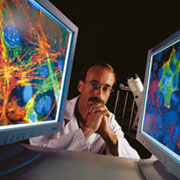 |
 |
|
 |
 |
 |
 |
 |
|
 |
 |
 |
 |

 |
 |
 |
 |

|
 |
Return to Table of Contents
 |
|
| Ron Vale, MBL Physiology course co-director |
|
Revamped Physiology Course Meets New Challenges in Biology Head On
When Mio Nonaka, a student at Kyoto University’s Graduate School of Science, heard about the MBL’s newly retooled Physiology course, she knew she had to apply. “I heard about the course’s reputation from my supervisor,” says Nonaka. “I wanted to experience doing research in the best country to do science. And everybody believes the MBL is the magical place to produce good results.”
Nonaka is among the twenty-seven graduate students who were accepted into this highly competitive and rigorous summer course this year. And thanks to the MBL’s newly appointed Physiology course directors, Ron Vale of University of California, San Francisco, and Tim Mitchison of Harvard Medical School, the students didn’t encounter an ordinary science course. They entered a new realm of cell physiology.
“This intensive laboratory course has been revamped to meet new challenges in biology,” reads the new course description. And this much is clear: Vale and Mitchison, two leading cell physiologists, aren’t just meeting these new challenges; they’re grabbing them by the horns and changing the rules as they go.
Vale and Mitchison have, in essence, completely remodeled the MBL’s Physiology course. The six-week course has always had a reputation as rigorous and comprehensive. But the new focus is on cells as a whole unit, rather than individual parts. And collaboration, not individual research, is the buzzword.
“In the next era of biology, we must address how the many components of the cell work together, which presents entirely new challenges and demands new approaches,” says Vale. “We must take the parts lists of cellular processes and turn them into true understanding.”
Toward this end, the new course promotes a novel multidisciplinary approach. “Our vision is to bring together biological/computational scientists, both in the faculty and the student body, to work together on cutting-edge problems in cell physiology,” says Vale. “We need to create a new breed of researchers who are skilled in multiple disciplines.”
So when Nonaka and her classmates arrived bright-eyed and eager in Woods Hole, they found themselves immediately immersed in a new kind of scientific life: one filled with in-depth laboratory work; lectures by top cellular physiologists, microscopists, and computational biologists; and numerous informal opportunities to exchange information and ideas.
“I learned how important collaboration is for creativity,” says Nonaka. “One plus one equals more than two.” Which is precisely Vale’s and Mitchison’s goal.
So far, their vision for the Physiology course has resonated far and wide. In addition to luring students from Japan, the U.S., the Netherlands, Germany, Israel, and Denmark, this summer’s inaugural course drew an all-star faculty lineup. Visiting scholars, whose job is to provide inspiration and a sense of past and future for the students, included London Research Institute’s Tim Hunt (whose discovery of cyclin during the Physiology course led to the 2001 Nobel Prize), Max-Planck’s Tony Hyman, Harvard’s Andrew Murray, and University College’s Martin Raff.
One alluring aspect of the new course for both faculty and students must surely be that the MBL is one of the only educational institutions currently offering this kind of multifaceted approach to science. “Most university courses are still traditionally based in a single department or graduate program model, and most graduate schools aren’t yet providing interdisciplinary training,” says Vale.
“I don’t think I could find a course like this anywhere else in the world,” says Nonaka. “Every summer, excellent researchers and students gather in Woods Hole and share enthusiasms in research. The reason why this repeats only [at the MBL] is its own history and good environment.”
Fortunately for Nonaka and other up-and-coming biologists, the MBL’s history includes a penchant for offering innovative courses by premiere course directors—scientists who are willing to push limits and change rules in the name of great science.
And what of those magical MBL results? “Although education, not obtaining data is the course objective, this year’s Physiology students had many exciting research findings,” says Vale. “One of Nonaka’s course projects produced results that will be presented at the December 2004 American Society of Cell Biology meeting in Washington, DC. It’s one of four abstracts at this meeting that emerged from this course.”
|
|
| |
 |
|
 |
 |
|